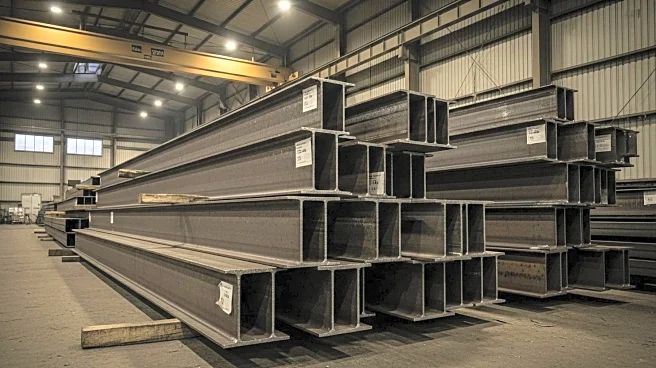What's Happening?
The European Union has announced a significant increase in steel tariffs and a reduction in import quotas, causing alarm in the United Kingdom. The EU plans to cut tariff-free quotas on imported steel by 47% compared to 2024 levels and increase tariffs from 25% to 50% on excess imports. This move is intended to protect the EU steel industry and support its decarbonization efforts. The UK steel industry, already facing challenges such as closures and job losses, is particularly affected, with the EU accounting for approximately 80% of UK steel exports. Gareth Stace, director general of UK Steel, described the situation as potentially the biggest crisis the UK steel industry has ever faced.
Why It's Important?
The EU's decision to hike tariffs poses a significant threat to the UK steel industry, which relies heavily on exports to the EU. The increased tariffs could severely limit access to the UK's largest market, exacerbating existing pressures from global competition and rising energy costs. The move also mirrors similar protective measures taken by the US and Canada, highlighting a global trend towards safeguarding domestic industries. The automotive sector, which heavily relies on steel, is concerned about potential price increases and supply chain disruptions, which could impact production costs and competitiveness.
What's Next?
The UK government is likely to seek exemptions from the EU tariffs, similar to those granted to countries within the European Economic Area. Discussions with the EU and US are ongoing, with potential retaliatory measures being considered to protect UK steel producers. The situation may lead to further negotiations to maintain trade flows between the UK and EU, while addressing global challenges in the steel industry. The EU's willingness to exempt Ukraine from duties due to its security situation may offer a precedent for the UK to negotiate similar terms.
Beyond the Headlines
The tariff hike could have broader implications for the EU's relationship with the UK, potentially affecting other sectors reliant on steel. The move may also influence global trade dynamics, as countries increasingly adopt protectionist measures to safeguard their industries. The focus on decarbonization within the EU steel industry highlights the growing importance of environmental considerations in trade policies, which could lead to long-term shifts in industry practices and international trade agreements.










